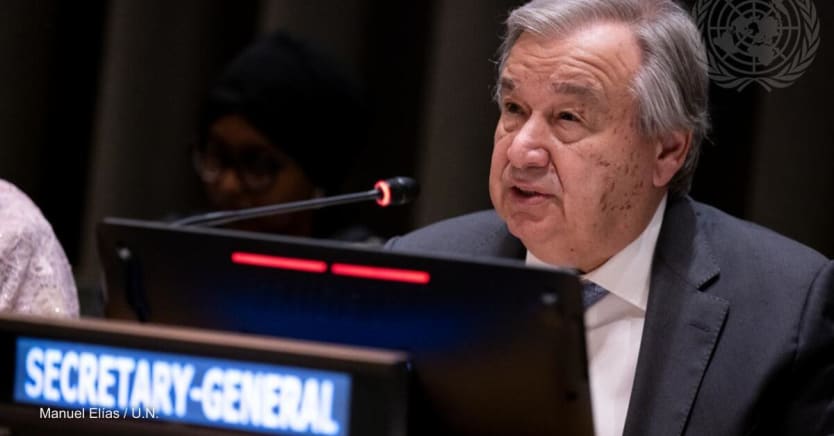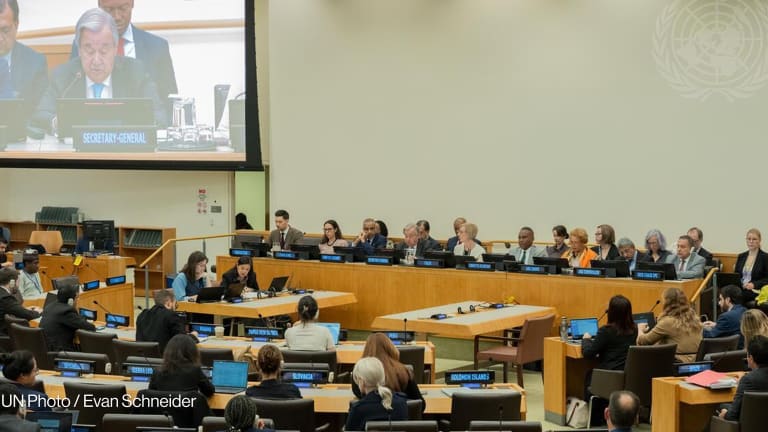Opinion: The UN Summit of the Future is crunch time for António Guterres

With three years left at the helm, António Guterres is running out of time to make a lasting impression on a United Nations creaking under the strain of pandemic recovery, an uptick in violent conflict, and the global governance challenges associated with climate change and emerging technology.
In 2023, Guterres unveiled his vision for a transformed system of global governance. The “New Agenda for Peace” — NAfP — was his offering on peace and security. The U.N. Secretary General aims for the 37-page document, circulated to member states back in July to little fanfare, to deliver on the U.N.’s “elusive promise” of peace.
The landing point for his proposals is intended to be the Summit of the Future, or SoTF, to be attended by world leaders in September. While Guterres works on diplomats in New York, he’s sent his policy chief on a tour of capitals to press foreign ministries on the U.N.’s proposals.
Germany and Namibia have bravely put themselves forward as co-facilitators of the consensus-bound SoTF outcome document: the “Pact for the Future.” Negotiations begin in earnest after the co-facilitators circulate their “zero draft” of the pact, expected by the end of January, based on initial consultations with states and input from civil society.
It’s hard to overstate the challenge: from a dizzying mélange of possible issues, they must produce something that is both meaningful yet sufficiently inoffensive for 193 U.N. member states to settle on. The task could be made more realistic, and more meaningful, if U.N. delegations were reminded of the difference between consensus and unanimity — the former being something that must be forged, not found.
From the archives:
Can António Guterres lead a broken United Nations?
The U.N. secretary-general has faced a dysfunctional Security Council, an isolationist White House, and entrenched bureaucracy. In the face of COVID-19 and climate change, can António Guterres lead the world to collective action?
Guterres prodded states toward the summit through a marathon of self-spawning consultations — states acquiesced, scheduled the summit, and invited Guterres to feed in recommendations across the full policy spectrum. Summits can work well as a means to thrash out and endorse solutions at the highest level to clearly defined problems, such as was the case with the summit to adopt the Sustainable Development Goals back in 2015. The SoTF is the opposite: a summit in search of a clearly defined problem.
Adding to the challenge, the environment for negotiations is febrile due to the diplomatic turmoil and resurfacing divisions as a result of the devastating war in Ukraine and the widening conflict in the Middle East.
In this fraught environment and with minimal diplomatic bandwidth available, Guterres’ New Agenda for Peace may offer a neutral starting point and help guide what will likely be the most contested bit of the wide-ranging pact: the chapter on peace and security.
So where could the Pact for the Future process add value?
Peace and security
The NAfP highlights the limits of the U.N.’s role in peace and security, emphasizing national action by including the “whole-of-government and whole-of-society,” while noting that no state, no matter how powerful, can be successful on its own. Without passing the buck from member states, proposals to increase inclusivity could offer promising material for the pact, for example, elaborating on civil society’s vital role in peace-building processes.
Opinion: 2024 must be the year we go back to the future
In 2024, as geopolitical fault lines are hardening, the Summit of the Future is an opportunity to focus on immediate priorities and future global challenges.
Informally, some diplomats were unimpressed with the NAfP’s focus on the African Union with scant attention paid to other regional bodies. However, the basic principle of the need for better U.N. link-up with regional organizations — what Guterres calls “networked multilateralism” — is sensible and could garner support.
Pact negotiations could also elevate various proposals, some of which are outlined in the NAfP, to strengthen the U.N. General Assembly’s role in peace and security and improve the Peacebuilding Commission.
This would tap into the widespread outrage over Security Council inaction, most recently spurred on by vetoes by Russia over Ukraine and the U.S. on Gaza. While few would defend the current shape of the council, in the current environment this may be a more savvy approach than the infinitely unproductive quagmire of Security Council reform.
UN accountability
U.N. accountability is hardly featured in the NAfP, but the significant support base for overhauling the way the U.N. selects and monitors its senior leaders makes this a contender for the pact. At present there is almost no transparency around appointments of the U.N.’s top peace and security jobs: Office of Counter-Terrorism, Department of Political and Peacebuilding Affairs, and Department of Peace Operations. It is no coincidence that the top post-holders are invariably nationals of permanent members of the Security Council: Russian, American, and French, respectively.
Failures in internal justice systems, inadequate whistleblower protections, and inequality in senior appointments continue to stain the U.N.’s reputation. The pact could give a high-level boost to calls for change.
Arms control and AI in warfare
Unsurprisingly, recent threats from Russia and Israel, and expanding nuclear arsenals, have made disarmament a priority at early pact consultations. The Arab Group as well as Latin American states are demanding action on conventional arms control including small arms and ammunition. Some nations think now is the time to reform the stagnant Conference on Disarmament, others want to see action on military spending raised by the pact to help avert a new arms race.
The dangers of AI in global development (Pro)
The opportunities for artificial intelligence to enhance development work are plentiful — but should the sector be worried about the pitfalls? We asked the experts.
To realize its mandate, though, the SoTF must do more than tinker with current frameworks — it needs to tackle new challenges for which governing frameworks do not yet exist, like regulating artificial intelligence, a field that Guterres has deemed fraught with “potentially catastrophic and existential risks.”
The pact could also tap into the significant momentum for establishing a new treaty to govern AI in warfare. The summit could support action here, enshrining principles such as the idea of a prohibition on the autonomous targeting of humans by machines. Guterres’ proposals for an “Emergency Platform” could also gain traction.
A salvageable summit?
Agreeing actionable language for the pact will be challenging. The chances of clambering toward consensus will be improved if states can break out of their traditional voting blocs. Singapore set a positive example here, convening a cross-regional group of 55 small states in November to lay out their vision for the SoTF.
If support for pact negotiations can be mobilized on an issue-by-issue basis — what some diplomats are calling “variable geometry” — then it may be possible to avoid a descent to lowest common denominator platitudes.
Where new responsibilities are envisaged for the U.N., the pact must be clear about who is expected to do what, ensuring proposals do not exacerbate interdepartmental tussles and paralysis. States should do the same, communicating clearly before and during the SoTF on how the pact will be taken up by their domestic ministries.
Guterres has jockeyed for this summit for years; now it is around the corner and the odds of success look long. But states may yet be able to find a use for the occasion: the U.N. desperately needs an upgrade and the urgency and enormity of current challenges could lead to novel ways of working together. If this happens, there are enough good ideas out there and perhaps the odds could come good.
Search for articles
Most Read
- 1
- 2
- 3
- 4
- 5









